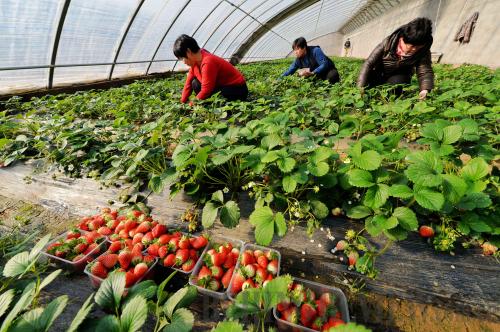|
 |
|
JUICY FRUITS: Farmers of Xibeiliu Village of Xingtai, north China's Hebei Province, pick strawberries in a greenhouse on January 21 (ZHU XUDONG) |
Shipbuilding
Though the Chinese shipbuilding industry has yet to come in from the cold, recent restructuring as well as cuts in overcapacity and upgrades have given the troubled industry more hope, a report showed.
The industry received new orders with dead weight tons of 70 million in 2013, up 242 percent from 2012, according to a report posted by the Ministry of Industry and Information Technology.
Altogether, 80 percent of these new orders went to the 20 industry leaders, up 5.5 percent from 2012.
The industry had attracted orders for sophisticated ships, the report said, citing six liquefied natural gas carriers and four very large gas carriers.
Despite the progress, insiders believe that hard times for the industry are far from over, as it grapples with a recession caused by waning demand and higher costs, following the financial crisis of 2008. Chinese authorities have introduced a slew of measures to encourage upgrading and mergers.
Zhang Guangqin, President of the China Association of the National Shipbuilding Industry, said it will take at least another five years to ease the influence of overcapacity.
Polysilicon Tariff
China's Commerce Ministry on January 20 imposed five-year duties on solar-grade polysilicon imports from the United States and the Republic of Korea (ROK).
China will apply anti-subsidy duties of up to 2.1 percent and anti-dumping duties ranging from 53.3 percent to 57 percent on polysilicon imports from the United States. The rates for imports from ROK are set between 2.4 percent to 48.7 percent.
The decision came after China began to levy provisional duties on polysilicon imports from the two countries in 2012 following preliminary investigations that found exporters dumped their products on the Chinese market.
Solar-grade polysilicon is an important material for making solar cells, a sector fraught with trade disputes. | 